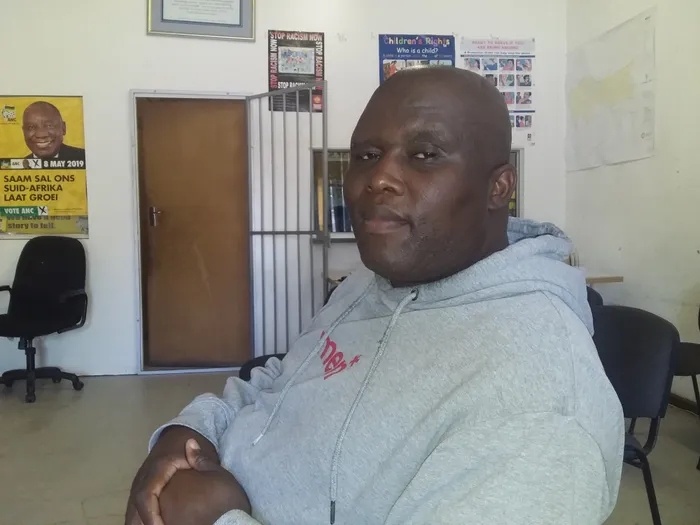Taxi owners say permit halt is kicking them to the kerb

Taxi owner Mawethu Sila, whose taxi operates in Kraaifontein, is appealing to the provincial Department of Transport and Public Works to issue permits.
Kraaifontein taxi owners say they have lost millions of rand because of a blanket moratorium on permits that followed 2018 taxi violence in Bellville.
Owners from the Bloekombos and Wallacedene Taxi Association (Bloewata) peg their combined losses at R5m.
The Priority Committee on Transport - comprising the provincial Department of Transport and Public Works, the City of Cape Town, the National Prosecuting Authority, and police - was established in 2018 and it immediately shut down the Bellville and Bloekombos taxi ranks for five days after violence broke out.
An arbitration process was set up by Cape Amalgamated Taxi Association (Cata) and Congress of Democratic Taxi Associations (Codeta) taxi owners to settle differences. The process is still ongoing and will conclude in 2023.
The R5m loss is partly because of the arbitration process - which, taxi owners say, has been used as a reason not to issue licences - despite the taxi industry growing rapidly and new routes emerging since 2018, says Bloewata executive member Mawethu Sila.
In an interview with the Northern News, Mr Sila laid bare differences between the taxi industry and Transport and Public Works MEC Bonginkosi Madikizela.
However, the department denies there is a moratorium on permits.
Although he supports the arbitration process, Mr Sila said the department had used the process as an excuse not to issue permits.
No operating licences had been issued for new routes since the start of the arbitration process, he said.
Mr Sila suggests that taxis who are operating on contentious routes unaffected by the arbitration process should be supplied with stickers by the department to show they have applied for permits while the arbitration process unfolds.
“The arbitration process has closed the door on permits. We’re saying the arbitration process is for the Bellville matter, it should not have an effect on permits on new routes.
“If they are not releasing permits, why don’t they supply us with stickers to protect us from law enforcement? Government says they’re waiting for the process of arbitration to conclude, which is in 2023.”
Several Bloewata owners had lost their taxis to final impoundment and had been blacklisted from acquiring new vehicles because they were in debt, he said.
New routes include Stellenbosch, Kuils River, Mutual, Klapmuts, Uitsig, among others.
“Due to impoundments, we’ve lost R5m because of impounded taxis and the subsequent fallout from that, including having to pay up to R15 000 to release a taxi. How are you going to get it released when it’s impounded and not working?”
Bloewata members lost about three or more taxis per week to targeted impoundment, he said.
A taxi impounded for a fourth time is marked “no release” by the authorities at Ndabeni Vehicle Impoundment Centre, and Mr Sila said that forced taxi owners into debt.
However, the department says the “new routes” are also contentious and that there is no blanket moratorium on operating licences.
“The ‘opening of new routes’ by associations is, in itself, contentious,” said department spokesman Jandré Bakker.
“Associations are well aware of the process that must be followed for the registration of new routes.
“The planning authority, in this case the City of Cape Town, has to grant approval for new routes, based on their Integrated Transport Plan (ITP) or surveys that may be conducted to determine demand and required supply.”
He said the authorities had identified cases where taxi associations had blocked legal operators, driving up demand on that route which they then claimed.
“For this reason, the planning authority plays an important role in confirming ‘new demand’ in the context of existing, legal supply of services.”
Mr Bakker said there were also cases of unscrupulous taxi leaders who charged exorbitant joining fees and membership fees to desperate taxi owners and promising them operating licences.
“When vehicles are impounded, such unethical leaders are often targeted for not keeping promises that they were not in a position to make in the first place,” Mr Bakker said.
Traffic authorities would continue clamping down on taxis without permits, he said.
“With regards to impounded vehicles, if we are provided with the details of impounded vehicles, our department or the City of Cape Town can respond to specific cases and not to general statements.”
Mr Sila said government was putting taxi owners out of business. “Once you take someone’s bread out of their mouths, where do you think they’re going to to go? Crime, of course. And Kraaifontein already has that in abundance.”